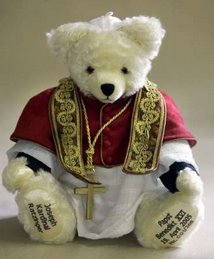Lay ministers may not cleanse Communion vessels, Pope Benedict says
By Nancy Frazier O'Brien
Catholic News Service
WASHINGTON (CNS) -- At the direction of Pope Benedict XVI, extraordinary ministers of holy Communion will no longer be permitted to assist in the purification of the sacred vessels at Masses in the United States.
In an Oct. 23 letter, Bishop William S. Skylstad, president of the U.S. Conference of Catholic Bishops, asked his fellow bishops to inform all pastors of the change, which was prompted by a letter from Cardinal Francis Arinze, prefect
of the Vatican Congregation for Divine Worship and the Sacraments.
The U.S. bishops had asked the Vatican to extend an indult -- or church permission -- in effect since 2002 allowing extraordinary ministers of holy Communion to help cleanse the Communion cups and plates when there were not enough priests or deacons to do so.
Bishop Skylstad, who heads the Diocese of Spokane, Wash., said Cardinal Arinze asked Pope Benedict about the matter during a June 9 audience, "and received a response in the negative."
Noting that the General Instruction of the Roman Missal "directs that the sacred vessels are to be purified by the priest, the deacon or an instituted acolyte," the cardinal said in his Oct. 12 letter that "it does not seem feasible, therefore, for the congregation to grant the requested indult from this directive in the general law of the Latin Church."
Although receiving Communion under both kinds is a "more complete" sign of the sacrament's meaning, Cardinal Arinze said, "Christ is fully present under each of the species."
"Communion under the species of the bread alone, as a consequence, makes it possible to receive all the fruit of eucharistic grace," he added.
Another "legitimate option" when "the high number of communicants may render it inadvisable for everyone to drink from the chalice" is intinction -- the practice of dipping the consecrated host into the consecrated wine -- "with reception on the tongue always and everywhere," the cardinal's letter said.
Along with the letters from Bishop Skylstad and Cardinal Arinze, bishops received a new resource prepared by the bishops' Committee on the Liturgy titled "Seven Questions on the Distribution of Holy Communion Under Both Kinds."
The committee document also suggested distribution of Communion by consecrated bread alone or by intinction when the number of communicants makes the purification of vessels by priests, deacons or instituted acolytes alone "pastorally problematic."
"Priests should also keep in mind potential risks associated with intinction, especially in the coming flu season," the document added.
The committee said extraordinary ministers of holy Communion may continue to "consume what remains of the precious blood from their chalice of distribution with permission of the diocesan bishop."
The document notes that the "extraordinary ministry" by which laypeople distribute Communion "was created exclusively for those instances where there are not enough ordinary ministers to distribute holy Communion, due to the consummate importance of assuring that the faithful have the opportunity to receive holy Communion at Mass, even when it is distributed under both species."
Ordinary ministers of Communion are priests and deacons, with instituted acolytes being permitted in the Roman Missal to help the priest or deacon "to purify and arrange the sacred vessels."
In the United States, instituted acolytes, who must be male, generally are seminarians preparing for priesthood.
My comment with regard to the first highlighted part is that a friend of mine said to me 'You can just imagine the conversation between Cardinal Arinze and the Holy Father, it would have been a dismissive wave of the hand, and that would be it'.
My second, is a question. I understood that the practice of dipping the consecrated host into the consecrated wine was banned by the Church. Perhaps someone out there can answer this for me?


4 comments:
I haven't really looked into this, but I have heard from someone who might possibly know.
They had said that intinction was allowed but only by the priest and then can only be received on the tongue NOT in the hand obviously because the precious blood wouldn't stay in the hand.
Also people are NOT allowed to dip their host (they have just received in the hand) in the precious blood as I have seen many people do in my own parish (which I no longer attend unless it is absolutely necessary)
Only Mons is correct. The specific reason why intinction by the recipient is not aloud is that, strictly speaking, it is 'self administration' and the Eucharist should be received not taken. Although it is quite true that it is also messy, unhygienic, not part of any tradition and seems disrespectful. Intinction by the clergy for the faithful, on the other hand, is similar to the practise of the Armenian rite and, with the careful use of a communion plate, can be otherwise fine.
Wow! That's a new one... everythings changing.. AGAIN!
God bless
Maria in the UK
www.inhishands.co.uk
So, exactly who will be washing the purificators and any linens that will dry, wrap, or otherwise touch the purified vessels? God forbid any lay people wash, fold, store, or manipulate in any way these materials. When they aren't pure enough to cleanse the vessels, why should they be allowed anywhere near the cloths that will handle them?
Will our priests, deacons and instituted acolytes actually be doing the parish's laundry now?
Post a Comment